Introduction
In the rapidly evolving landscape of software development, container orchestration has emerged as a pivotal solution for managing the complexities associated with containerized applications. As organizations increasingly adopt microservices architectures, the ability to automate deployment, scaling, and management becomes essential for maintaining operational efficiency.
This article delves into the intricacies of container orchestration, comparing leading platforms such as:
- Kubernetes
- Amazon ECS
- Docker Swarm
By examining their unique features, strengths, and challenges, it becomes clear that the choice of orchestration tool significantly impacts an organization’s ability to innovate and adapt in a competitive environment. Furthermore, understanding the nuances of each platform is crucial for organizations seeking to optimize their container management practices and ensure compliance in an era where operational integrity is paramount.
Understanding Container Orchestration: An Overview
Container management plays a critical role in automating the deployment, scaling, and administration of containerized applications, which is increasingly vital as organizations transition towards microservices architectures. This method facilitates the management of complex operational tasks such as load balancing, service discovery, and automated rollouts and rollbacks. As a result, developers can prioritize coding over infrastructure management, thereby enhancing operational efficiency and expediting time-to-market.
A thorough understanding of container orchestration comparison is crucial for assessing platforms like Amazon ECS and Docker Swarm. Each of these tools offers distinct features when considering a container orchestration comparison to meet various organizational requirements. For instance, Kubernetes, originally developed by Google, stands out as a leading open-source solution, despite its inherent complexities and security challenges.
However, recent statistics reveal a concerning trend: 26% of organizations reported failures in audits related to their management practices. This statistic emphasizes the essential requirement for strong management frameworks to guarantee compliance and operational integrity—particularly as sectors such as financial services and telecommunications keep growing their production capabilities. As Carolina Dulin emphasizes, 'The evolution of container orchestration comparison tools is not just a technological advancement but a necessity for maintaining operational integrity.'
Furthermore, the 'Container Adoption' case study underscores the worldwide application of diverse tools and technologies linked to containerization, recognizing challenges encountered by organizations and stressing the advantages of efficient data management for international companies.
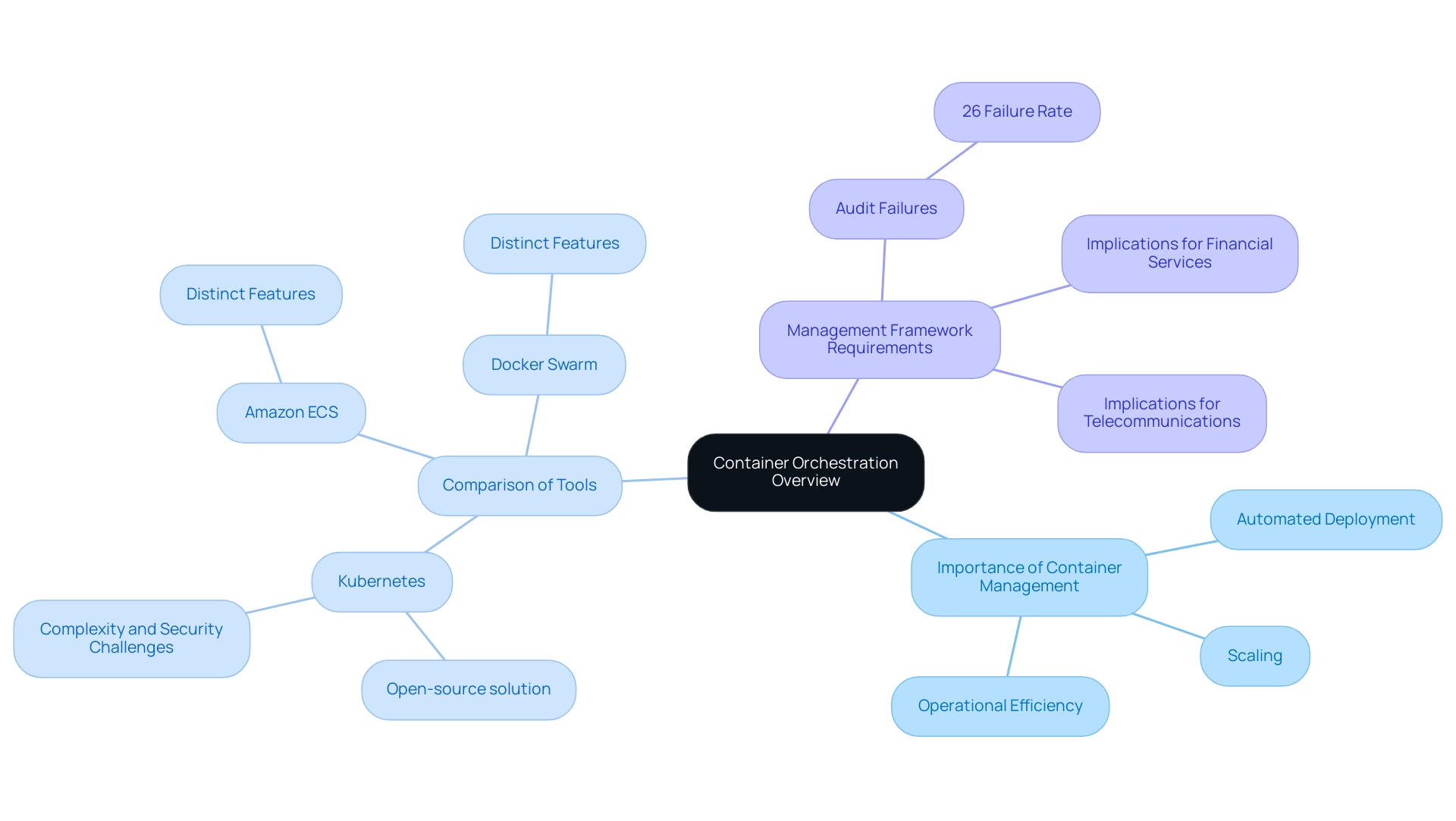
Feature Comparison: Kubernetes vs. ECS vs. Docker
The container orchestration tool stands out as a powerful open-source platform, renowned for its comprehensive feature set, which includes automated scaling, self-healing, and rolling updates. These capabilities are crucial for managing large-scale containerized applications, as highlighted by data scientist Moez Ali, who notes,
However, the management features of this system often outweigh this tradeoff in large-scale applications where reliability and scalability are prioritized.
With its support for a diverse array of runtime environments and seamless integration with multiple cloud providers, the platform has established itself as a flexible choice for organizations seeking to leverage application management effectively.
OpenShift further enhances this experience by providing a consistent, cloud-like environment across various platforms, making it an attractive option for organizations looking to maintain uniformity in their deployments.
In contrast, Amazon ECS operates as a fully managed service specifically designed to simplify the management of Docker instances within the AWS ecosystem. Its deep integration with various AWS services enhances operational efficiency, making it a compelling option for businesses that are heavily invested in Amazon's cloud infrastructure. Significantly, one of the essential distinctions between the platforms and Docker is that Docker emphasizes single units, while the other system oversees collections of units, offering a wider management capability.
Docker Swarm, in contrast, presents itself as the most user-friendly of the three, providing fundamental management features marked by simplicity of installation and usability. This simplicity makes Docker Swarm an excellent choice for smaller applications or teams that are just starting their journey into container management. For instance, the case study titled 'Docker for Data Science: An Introduction' serves as a relevant example, illustrating how Docker can be effectively utilized in machine learning applications, providing foundational knowledge for data scientists.
Ultimately, each platform brings its own distinct advantages, which are essential in a container orchestration comparison:
- The first option excels in flexibility and scalability for complex applications.
- ECS is unmatched in its integration with AWS.
- Docker Swarm offers a user-friendly experience suitable for less demanding environments.
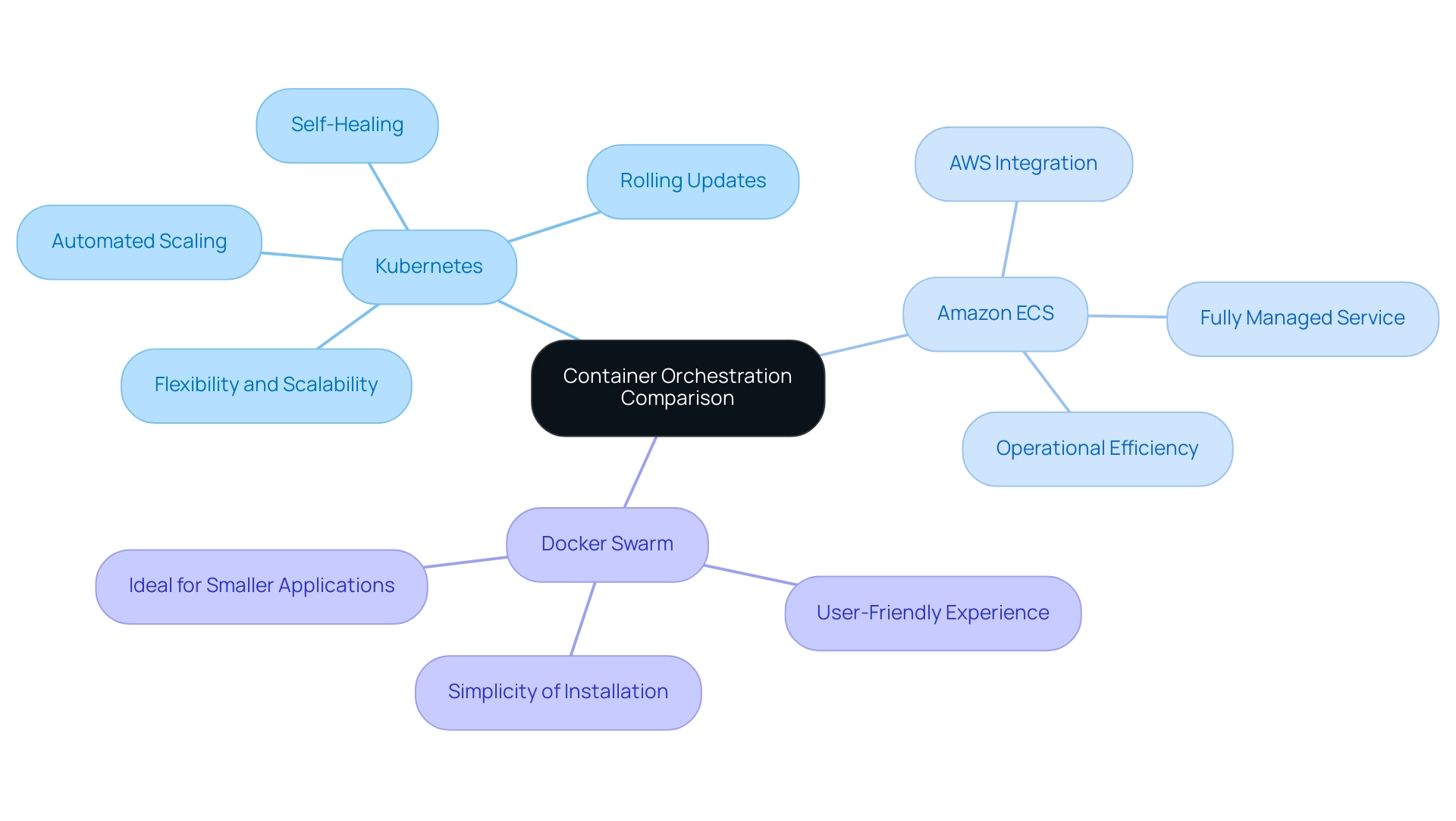
Key Differences Between Kubernetes and ECS
A significant distinction in the container orchestration comparison between the container orchestration platform and Amazon ECS lies in their orchestration methodologies. The container orchestration comparison highlights how the platform utilizes a declarative configuration model, enabling users to articulate the desired state of their applications. This contrasts with ECS's imperative approach, where users must outline specific steps to achieve that desired state.
According to a report scheduled for release in June 2024 by Statista, the worldwide quantity of services available on the Google Cloud Marketplace is anticipated to indicate the increasing use of container orchestration, which is backed by its strong ecosystem of plugins and tools that enable extensive customization and integration capabilities. In contrast, ECS's design is tightly woven into the AWS ecosystem, providing seamless integration for entities already leveraging AWS services. While this integration can be beneficial, it limits ECS's portability, as it primarily operates within AWS's infrastructure.
The platform, on the other hand, excels in facilitating multi-cloud deployments, offering organizations enhanced flexibility and the ability to operate across various cloud environments. As noted in the case study titled 'Reasons for Adoption,' businesses are increasingly choosing this platform, which highlights the container orchestration comparison due to its scalability and flexibility, critical in today's dynamic market. Cody Slingerland, a FinOps certified practitioner, emphasizes the importance of collaboration with internal teams and subject matter experts in understanding these orchestration approaches, further reinforcing this system's position as a preferred choice for enterprises seeking versatility in their container orchestration solutions.
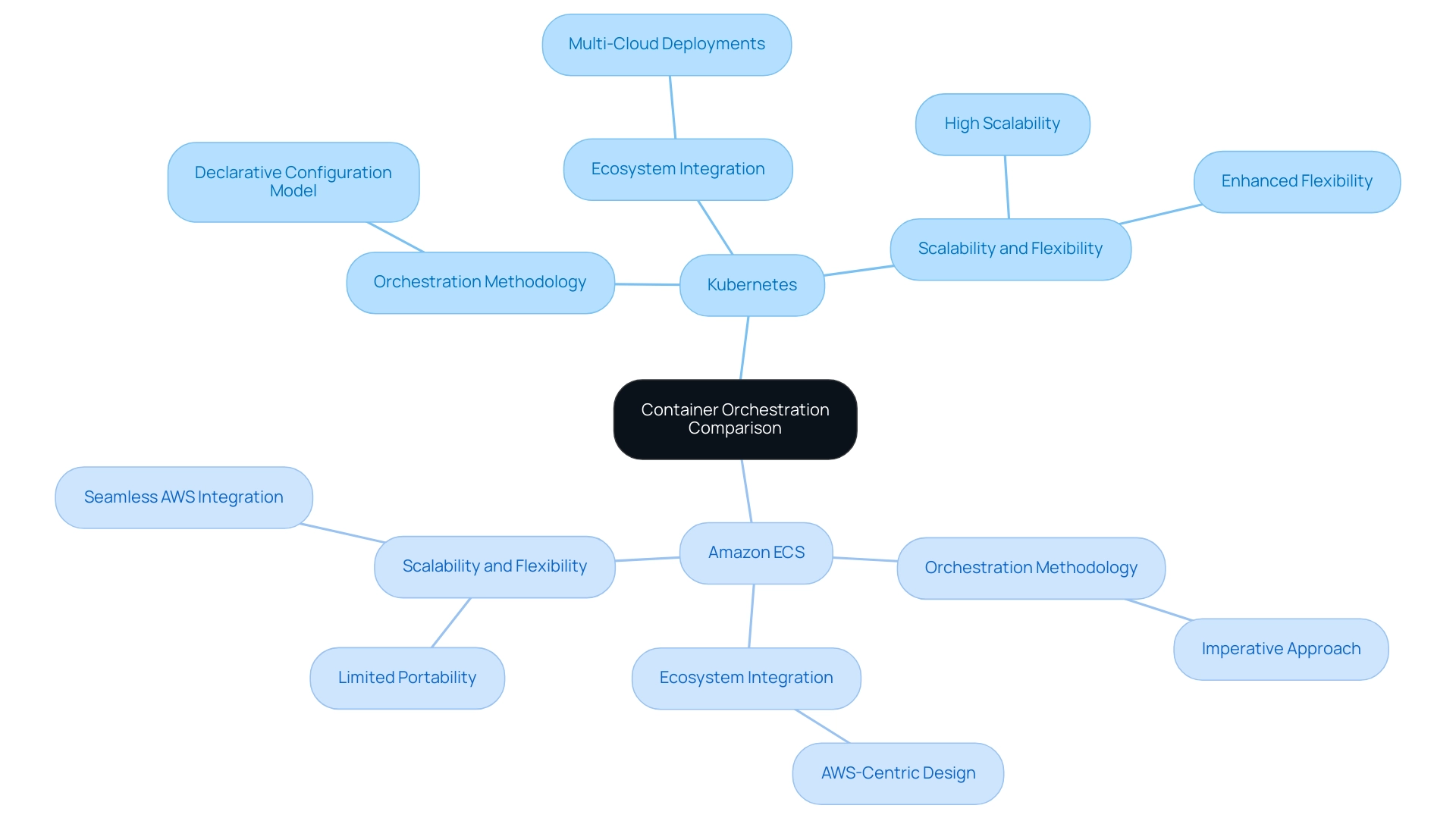
Challenges and Considerations in Using Kubernetes and ECS
The platform stands out for its robust capabilities; however, entities often grapple with its steep learning curve and the complexity involved in managing clusters. For example, a notable 30% of entities indicate that fewer than 10% of their workloads have been positively influenced by the technology, emphasizing the challenges encountered in operational execution. The intricacies of configuration and maintenance can lead to heightened operational overhead, particularly for those lacking in-house expertise.
In contrast, Amazon ECS offers a more straightforward setup process, which is appealing for organizations prioritizing simplicity. However, this ease of use comes at the potential cost of flexibility and customization, especially for those considering multi-cloud strategies. Furthermore, users must be vigilant regarding the associated costs; AWS services can accumulate rapidly, and container orchestration may necessitate additional investments in training and support to unlock its full potential.
Notably, over 50,000 businesses worldwide have made this container orchestration platform their preferred cluster management solution, highlighting the container orchestration comparison and demonstrating the system's extraordinary global acceptance. Furthermore, CloudBees, the sole institutional backer in the platform, emphasizes trust in its capacity for managing software environments. The growing number of Kubernetes users in the UK, nearly 4,000 businesses, highlights its effectiveness in improving operational efficiency and supporting digital transformation.
As such, companies are encouraged to thoroughly assess these challenges alongside their unique operational requirements and resource capacities before deciding on their preferred solution for a container orchestration comparison to manage software deployment.
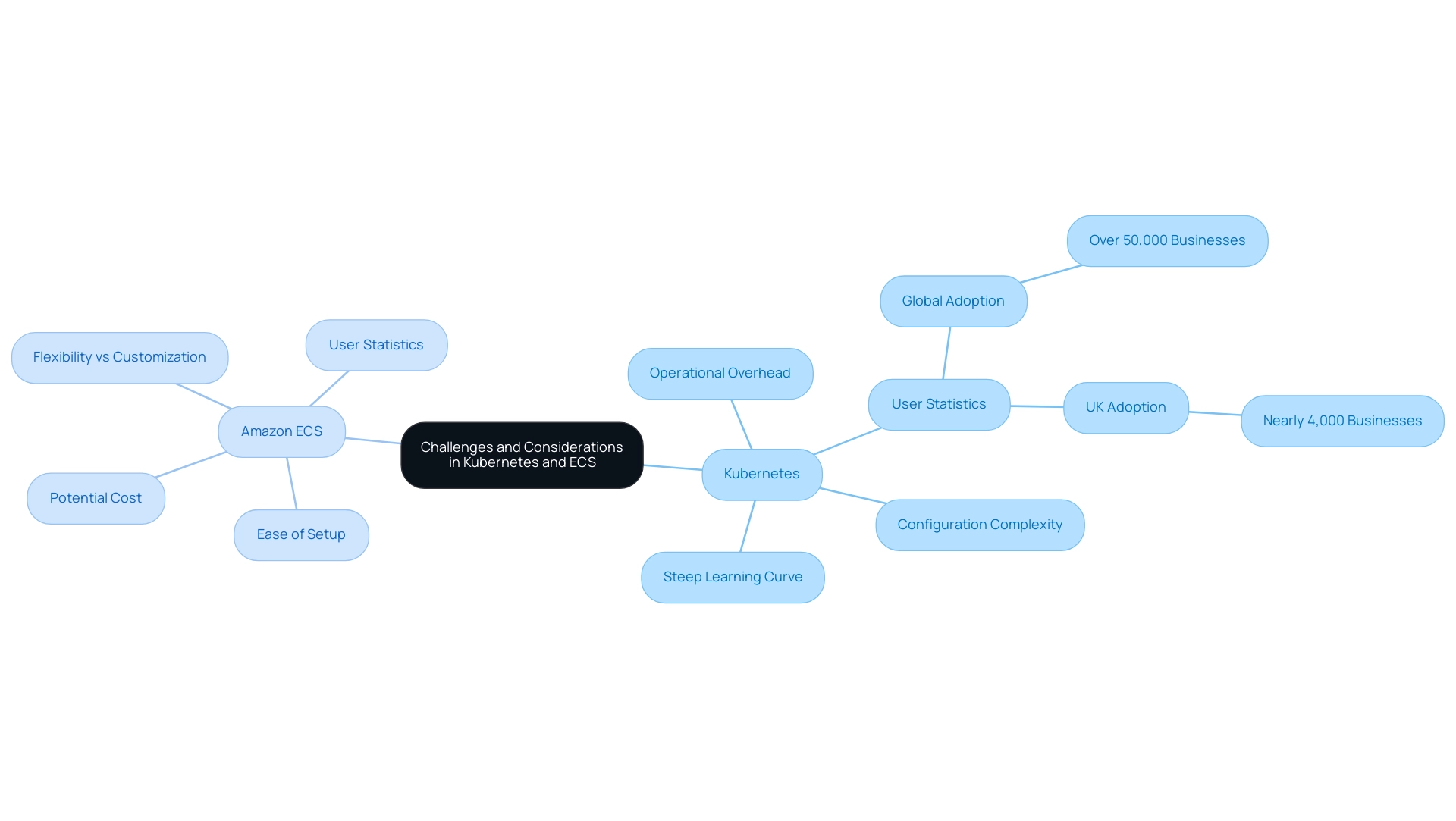
Choosing the Right Container Orchestration Tool: Factors to Consider
When making a container orchestration comparison in 2024, companies must assess several essential factors, including:
- Existing infrastructure
- Team expertise
- Specific use cases
Notably, teams with experience in AWS may find Amazon ECS to be the more natural choice due to its seamless integration with other AWS services, thereby facilitating a more efficient deployment process. Conversely, organizations seeking enhanced flexibility and multi-cloud capabilities often lean towards this technology, which is celebrated for its extensibility and the robust community that supports it.
According to recent statistics, teams with AWS expertise show a 30% faster deployment rate compared to those using other platforms, highlighting the influence of team experience on tool selection. Furthermore, the scale and complexity of applications play a pivotal role in this decision. Kubernetes is frequently favored for large-scale deployments due to its ability to handle complex architectures, while Docker Swarm may be adequate for simpler, smaller applications.
Aligning the selection of management tool with the organization’s strategic objectives and operational capabilities is crucial for fostering growth and ensuring long-term success. As highlighted in recent industry insights, effective management of remote offshore drilling teams involves leveraging technology, clear communication, and setting measurable goals.
The future prospects of the container orchestration software market are promising, driven by increasing consumer demand, technological advancements, and expanding applications, which highlights the importance of a thorough container orchestration comparison for making the right selection.
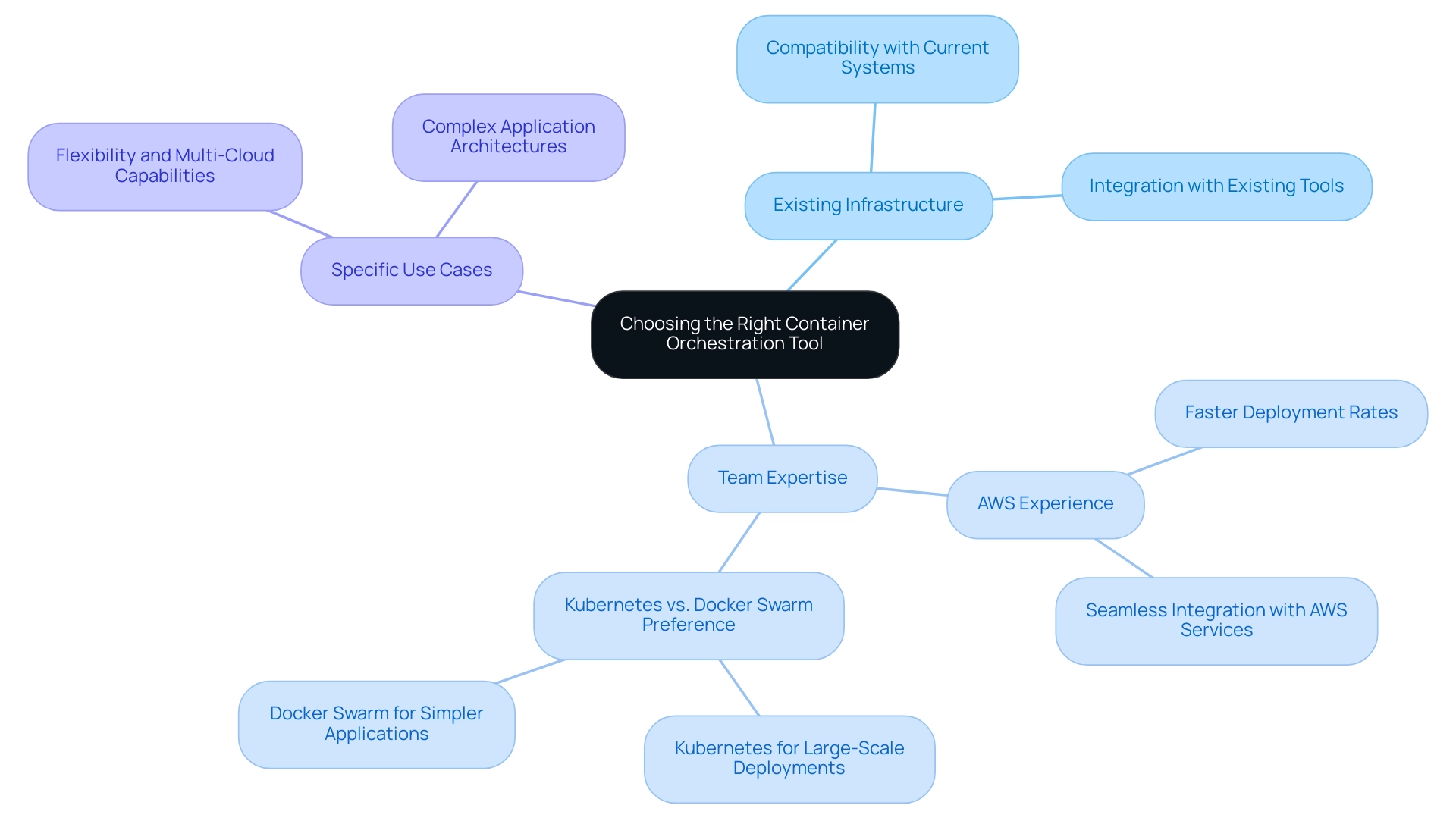
Conclusion
Container orchestration is undeniably a cornerstone of modern software development, enabling organizations to navigate the complexities of containerized applications with ease. As explored in this article, the comparison of leading platforms such as Kubernetes, Amazon ECS, and Docker Swarm reveals that each tool possesses unique features tailored to diverse operational needs.
- Kubernetes shines with its flexibility and scalability, making it ideal for large-scale applications.
- Amazon ECS offers seamless integration within the AWS ecosystem, catering to businesses already entrenched in Amazon's cloud services.
- Docker Swarm, with its straightforward setup, provides a user-friendly option for smaller teams or projects.
However, the decision to adopt a specific orchestration tool requires careful consideration of factors such as team expertise, infrastructure, and application complexity. The challenges associated with Kubernetes, including its steep learning curve, must be weighed against the simplicity of ECS and the inherent limitations it may impose on multi-cloud strategies. Organizations must align their choice of orchestration tool with their strategic objectives to foster innovation and operational efficiency.
In conclusion, the effective management of container orchestration tools is not merely a technical requirement; it is a strategic imperative that influences an organization's ability to adapt and thrive in a competitive landscape. By understanding the strengths and weaknesses of each platform, along with the specific demands of their operational environment, businesses can make informed decisions that enhance their container management practices and ensure compliance in an increasingly complex digital world. The future of container orchestration holds immense potential, and organizations that prioritize the right tools will be well-positioned to lead in their respective industries.




